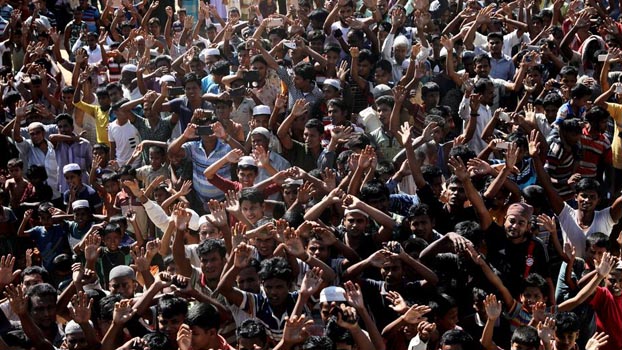30m people to get emergency help

Due to the ongoing lock down to stop the spread of Coronavirus, a concerted effort is being made to remove uncertainty over food distribution among a large number of people in the country. The government has a plan to provide food assistance to at least 30 million people who need emergency aid at the moment, and the government has taken a three-tier plan to address the situation.
The government is ready to help as many people as needed, said Shah Kamal, Senior Secretary of Disaster Management and Relief Ministry. Everywhere in the country, many are seen standing on the streets hoping for food assistance, everyday crowds are increasing at the government offices and houses of public representatives.
Officials at the field level hope the situation would soon calm down as the door to door food supply for marginalised people starts across the country. All government agencies, including the administration, armed forces, police, and Border Guard Bangladesh, are now working to distribute food with the support of local public representatives.
Shah Kamal said, it is still difficult to estimate the number of people who need emergency food supply.“But now we have the plan to assist around 30 million people who are under the poverty line or very close to extreme poverty. As time goes on, the number of people hoping for help will increase. Three types of plans are almost finalized. One plan is for until June this year, the other is until December, and the last plan is for next year,” he added.
He said till Thursday, the government distributed 50 thousand tonnes of rice and TK 200 million through district administration and local representatives. A Disaster Management and Relief Ministry source said, need differs from district to district. So, the government does not fix the relief items except rice and cash money. The government sends rice and money to the Deputy Commissioner of every district. In many cases, the district administrators distribute potatoes, pulses and other essential commodities instead of cash money.
Now the government allocates rice and cash money on every alternative day, based on the demand of the local administration. To stop the coronavirus outbreak, countrywide lockdown started last week. Since then, many private organizations and persons have been distributing food and cleansing items among the poor. In almost every area of the country, the poor are getting food for one or two days, even for one week or more, from the private sector.
Authorities are now going to instruct private organizations and people to follow the local administrations during the distribution so that every poor person may get the relief proportionately. In Chattogram, police are helping the non-governmental organizations and individuals to distribute relief door to door.
Describing his experience, Mohammad Mohsin, officer in charge of the Kotwali police station of Chattogram Metropolitan Police, said that at least 20 percent of people need food assistance at this moment. “In slum areas many people have collected foods as they could before the lockdown started. Within days their stocks will end, and more people will need assistance,” he said.
Mohammad Mohsin also said, in Kotwali area, police distributed food and other items among around 900 families, but at least 1500 families needed emergency assistance. On Thursday night many people were seen gathering in front of the Kotwali police station in hope of help. Some people handed over readymade foods to the police for distribution.
Zarina Begum, a restaurant worker who waited for packets with some other women, said it is not possible for everyone to get the food that is distributed on the streets. But the packets that are being distributed with the help of the police are orderly. There are lists of poor and ultra-poor in every City Corporation Office, Upazila Nirbahi Officer (UNO)office and DC office. Now the lists are being updated with the help of local government representatives to include the poor people who are now jobless for the lockdown.
Shah Kamal said that coordination should be made to distribute relief by the public and private sectors so as to ensure a balanced distribution for all. He said the government has also issued directives to non-governmental organizations and the private sector to seek support from the administration and police to avoid any unwanted situation during the distribution of relief. The government has also a network in every upazila through the Disaster Management Committee.





